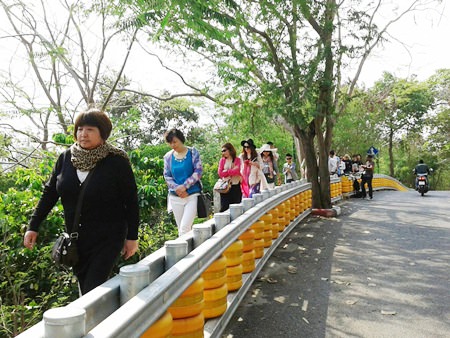The Chinese tourist invasion of Pattaya is not all that it was cracked up to be.
Hotels are mostly full, businesses are expanding, the roads are busy, boats are full and restaurants are full every other night. But most business owners say that while the Chinese invasion was great in the beginning, they’ve discovered the mainland tourists are not spending as much as expected.
Pattaya has changed during the past few years as many businesses have erected Chinese-language signs. Many investors were attracted to the mass of Chinese visitors as more resorts, hotels, condominiums and tour agencies opened. Now some places in Thailand are like Chinatown.
The majority of the Chinese visitors are on package tours, so mainly hotels are doing somewhat better. However, prices are reduced for everything including plane tickets, bus trips, accommodations, boat rides and many other attractions.
 Chinese tourists pass by a watch vendor as they hike up Pratamnak Hill in South Pattaya.
Chinese tourists pass by a watch vendor as they hike up Pratamnak Hill in South Pattaya.
Chinese brokers and businesses make agreements with various attractions to reduce the prices to get the tours. The result is that retailers and restaurants not on the tour are getting nothing.
In addition, many of the tourists are coming to Pattaya on “zero-coin tours” that offer the mainlanders cheap holidays for virtually nothing. But the tours’ use of illegal guides and the exploitation of the tourists once they arrive in Pattaya has tainted the country’s reputation, particularly among wealthy Chinese tourists.
Pol. Lt. Col. Jackkrit Wisedketkarn, head of the Department of Special Investigation Region 2 office in Chonburi, said the zero-coin tourists have undercut Pattaya’s tourism market because illegal Chinese guides take jobs from Thais and many of the businesses the tourists are pushed toward are illicitly operated by foreigners using Thai nominees.
The DSI currently is inspecting ownership records of restaurants, tour companies and real estate brokers in Pattaya, he said.
Paisan Suitanuwong of the Professional Tourist Guide Association of Thailand and secretary for the Tourist Guide Club of Central China, said zero-coin tours have grown due to the greed of particular business owners and it is unhealthy for the rest of the market.
Among high-end tourists – ones who stay in five-star resorts and generate large amounts of tourism revenue – Thailand increasingly is viewed as a cheap travel destination for budget tourists.
Paisan said the government needs to step up its effort to eliminate zero-coin tours as well as prosecute foreign-owned companies operating illegally.
Suladda Sarutilavan, director of the Tourism Authority of Thailand’s Pattaya office, said the agency’s Chinese officers are working to certify the tour companies offering Thai packages to stem the tide of cheap tours.
Umaporn, a gift shop owner in North Pattaya, said he would have expected his turnover to be much higher than it is, considering the number of visitors coming to Pattaya.
But he said his shop is off the tour-bus circuit and therefore doesn’t cash in on the Chinese tourism wave. Located near the Art in Paradise museum, his shop’s most frequent visitors are from India, Russia, South Korea and Thailand.
Atapol Prochu, who sells watches, belts, wallets, and souvenirs on the road leading to the Pratamnak Hill lookout spot, said competition is fierce, with many vendors lining up on the route to sell to the visitors. He said he can earn as little as 500 baht a day or as much as 3,000 baht.
Unlike some vendors, the Chinese have been steady customers for a fruit vendor identified only as Pattana. She said she parks her cart outside a shopping mall where tour buses drop off load after load of package tourists and sells them durian, mango, mangosteen, dragon fruit and rambutan at higher prices than she’d sell to Thais.
She admitted she gouges the tourists for prices 10-20 percent higher than for Thais, justifying it by saying it was a price foreigners were used to and that her rental space was costly.




